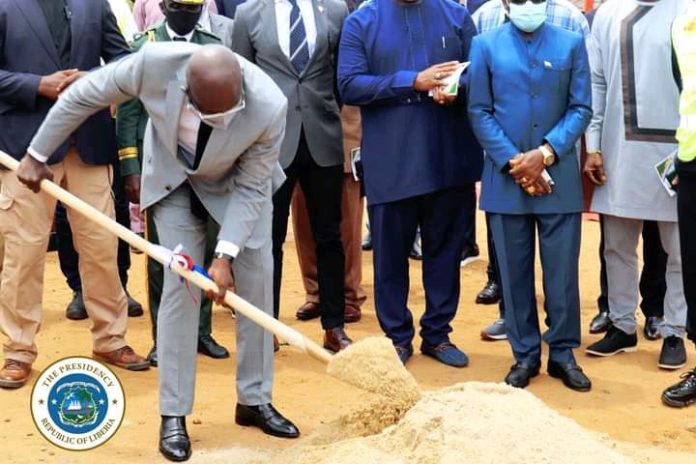Naymote, Partners for Democratic Development latest Presidential meter report has revealed that President George Weah and his government have not implemented nearly two-thirds of the promises they have made to the people of Liberia.
Naymote, Partners for Democratic Development is a good governance and research institution with over 20 years of professional experience working to advance the principles of democracy, rule of law, and participatory governance in and out of Liberia.
And since 2018 to December 2022), the group has been tracking presidential promises and reporting on the status of their implementation annually.
This year’s report comes ten months before the general and presidential elections. In its 2023 edition of the President Meter Project reports the group said it tracked 292 promises made by the president, his political party, and the government over the last five years with 65 promises coming from the Coalition for Democratic Change 2017 Manifesto, 34 from campaign speeches, policy statements, presidential priority projects (3Ps), and Annual Messages to the Legislature.
Six of the promises came from the COVID-19 State of Emergency (SoE) relief support 8 from Pillar four of the PAPD, 167 from the President’s Nationwide County tour of 2021 and 2022, eight from the President’s speech at the U.S. Summit for Democracy held in December 2021, and 4 from the President 65th Armed Forces Day Message on February 11, 2022.
Less promises fulfilled
Naymote in her assessment findings found that only 8% (24 promises) have been fully implemented by the government over the last five years. The assessment also found that the implementation of 91 promises (31% of all promises) was ongoing during the reporting period.
Out of all promises, the group indicated attempts have been made on only 39% (the sum of those completed and those with ongoing activities).
Naymote mentioned that 61% or 177 promises constituting nearly two-thirds of all promises, were identified as ‘Not started/ not rated’ because the government had not commenced work on their implementation, and there was no available information on their status.
According to Naymote, the majority of the promises implemented are promised under Pillar 2 of the CDC Manifesto (Economy and Jobs). These constituted (56%) of all completed promises. Specifically, Naymote said promises on infrastructural development received a high completion rate — constituting 38% of all completed promises.
The group mentioned that Pillar 1 of the CDC Manifesto (Power to the People) which has a total of 106 promises, has the lowest completion rate of 8%. Although the completion rate under Pillar 4 (Governance and Transparency) remains the lowest, the assessment however observed that implementation of some promises under this thematic area was ongoing and these could take several years due to the complex nature of the institutional and legislative reforms that may be required to fully implement them.
Additionally, Naymote said its assessment found that there were limited efforts by the government on promises centered on ‘Physically Challenge and Senior Citizens’, and action was taken on only 1 out of 10 promises under this sector. However, the government made progress by taking action on all 8 promises under ‘Gender Equality’.
Naymote, Partners for Democratic Development noted that as the Weah-led government completes its six-year mandate, it is time for the government leads internal processes of self-evaluation and prioritizes specific sectors for implementation ahead of the end of the mandate to particularly fulfill promises on governance, accountability, and anti-corruption are crucial as they were a key part of the many policy speeches that elicited support for President Weah during the presidential campaign and after the inauguration.
According to Naymote implementing promises in these areas are crucial for strengthening institutions and laying the foundations for delivering on all other promises.
The group said while the government’s focus on infrastructure, it needs to spur jobs and growth, was understandable, the slow pace at which they are implementing promises on crucial reforms needed to strengthen anti-corruption institutions, improve delivery capacity, and implement decentralization is concerning.
Naymote said the promised reforms would build the foundation and systems required to manage public infrastructures, sustain growth and retain jobs including making the Liberia Anti-Corruption Commission and the Public Procurement and Concession Commission more effective and efficient would potentially reduce waste, fraud, and abuse, and save resources for investment in social services and infrastructure.
“We therefore cannot overemphasize the need to accelerate these reforms through both the policy and legislative processes” the group said.
Naymote however indicated that the lack of data/information as well as the unwillingness of duty-bearers to provide information in some cases was an important challenge in tracking government promises which sometimes limits the space of the President Meter report.
The democracy group furthered that the lack of available information poses a greater challenge to accountability and government transparency indicating that public information on the status of government programs is important for building trust and enhancing accountability.
The group asserted that it is therefore crucial, for the government strengthens its public information dissemination mechanisms, and ensures periodic information on the status of all ongoing projects is provided to increase transparency and public trust in the government.
President George Weah was inaugurated in 2018 to a presidential term of six years. General and presidential elections are set to be held on October 10, 2023.
President Weah and dozens of legislators have declared their intention to contest the elections. Over the last five years (January 2018 to December 2022), Naymote Partners for Democratic Development has tracked presidential promises and reported on the status of their implementation annually.
The aim is to promote political accountability, influence public policy, and stimulate discussions among citizens and stakeholders. Naymote thinks that such discussion will empower and give voters a voice in reviewing the social contract between them and their leaders.






















